Introduction
In an increasingly complex digital landscape, businesses are turning to managed IT support services as a strategic solution to navigate the myriad challenges posed by rapid technological advancements and escalating cybersecurity threats. These services encompass a wide array of functions, from proactive network monitoring to robust data protection, allowing organizations to focus on their core operations while benefiting from specialized expertise.
As the demand for efficient and scalable IT solutions grows, understanding the key features and advantages of partnering with a managed service provider becomes essential for businesses seeking to enhance their operational resilience and security.
This article delves into the critical aspects of managed IT support services, exploring their benefits, common challenges faced by organizations, and the vital considerations for selecting the right provider to ensure sustained success in an ever-evolving technological environment.
What Are Managed IT Support Services?
Managed IT support services London entails the strategic outsourcing of a company's IT management duties to specialized third-party providers. This model encompasses a comprehensive range of functions, including:
- Network monitoring
- Robust cybersecurity measures
- Data backup solutions
- Dedicated help desk assistance
By collaborating with managed IT support services London, organizations can effectively enhance their technology infrastructure, ensuring it is not only well-managed but also aligned with overarching organizational objectives.
This strategic alliance enables companies to concentrate on their core business activities, significantly reducing the burden of IT management while simultaneously benefiting from managed IT support services London. Furthermore, the sector of managed IT support services London is poised for substantial growth from 2022 to 2032, underscoring the increasing reliance on these solutions for critical operational needs. As emphasized in recent discussions, significant trends in the Managed Solutions market include:
- Revolutionizing IT management
- The role of AI-infused managed offerings
Industry experts indicate that utilizing managed IT support services London can lower the risk of cyber attacks by up to 50%, highlighting the importance of outsourcing IT management. Furthermore, with 6 contributions in the venture capital discussion centered on gaining trust from potential investors, it is evident that there is considerable financial interest in managed IT solutions. A case study titled 'Managed Services Provider Statistics' illustrates the sector's growth potential, showcasing how organizations increasingly depend on managed services to optimize performance.
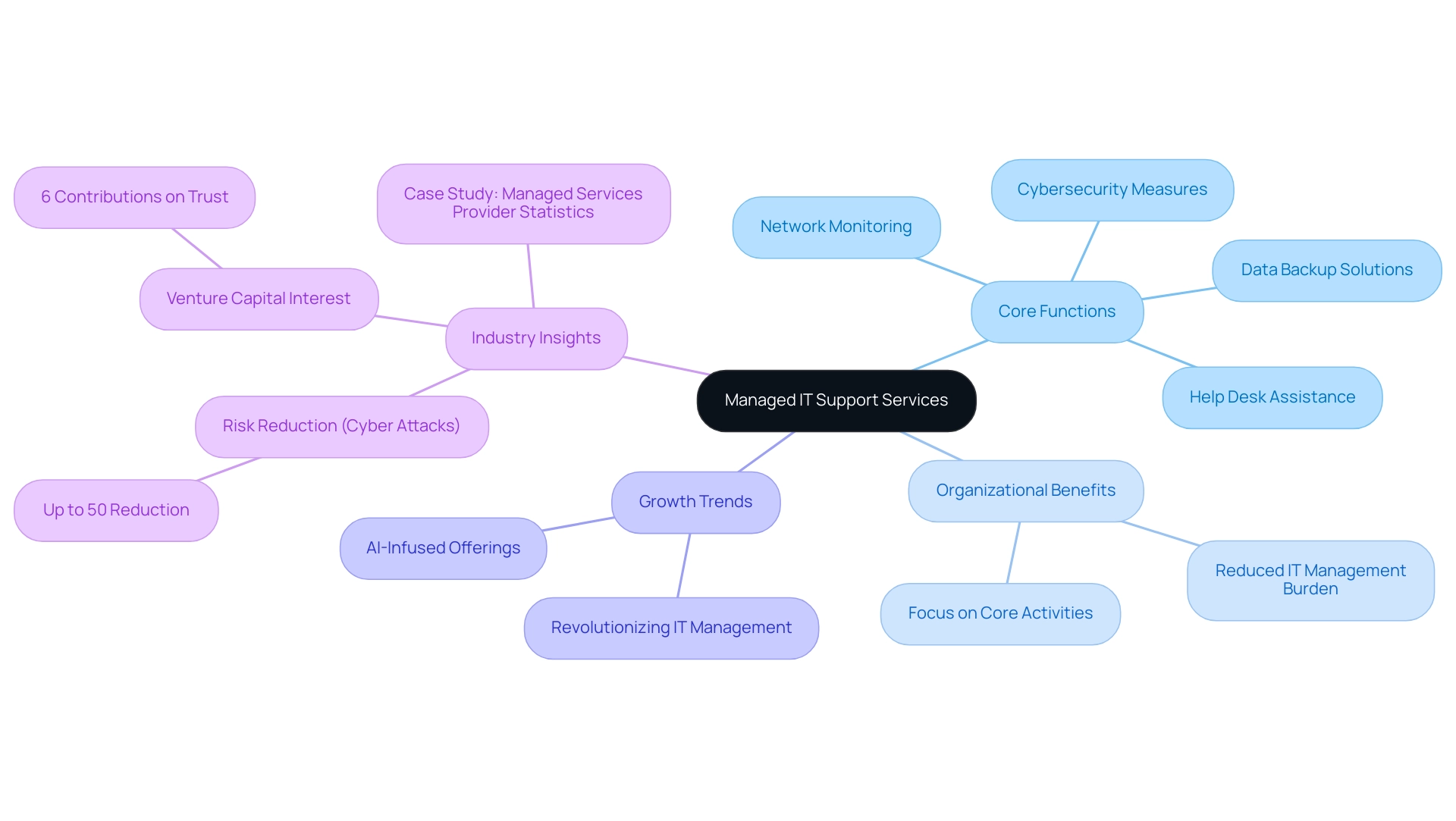
Key Benefits of Managed IT Support Services for Businesses
-
Cost Efficiency: Outsourcing IT support can lead to significant reductions in overhead costs associated with hiring and training in-house staff. Companies can save on salaries, benefits, and recruitment expenses, allowing for reallocation of resources to core functions. The managed IT support services London market, valued at $278.9 billion in 2022, is projected to grow to $834.7 billion by 2032, underscoring the growing recognition of the cost-saving potential of these services. This growth reflects the increasing trend of companies partnering with MSPs to enhance operational efficiency while optimizing costs.
-
Access to Expertise: Managed IT providers offer specialized knowledge and skills, ensuring that organizations remain at the forefront of technological advancements. This access is crucial, as 66% of enterprises consider automating operations their greatest challenge, highlighting the need for expert intervention in navigating complex IT landscapes. As stated in 'The State of AIOps 2023,' automating as many operations as possible is seen as the greatest IT operations challenge for enterprises, emphasizing the importance of leveraging MSP expertise to overcome these hurdles. By collaborating with MSPs, companies can access a wealth of expertise that would be costly and time-consuming to develop in-house.
-
Scalability: One of the key advantages of managed IT services is the ability to scale services in accordance with organizational needs. This flexibility allows organizations to adjust their IT resources dynamically, ensuring they only pay for what they require at any given time. Such adaptability is essential in a rapidly changing market environment, where businesses must respond promptly to shifts in demand. The growth of the managed services market, especially in terms of managed IT support services London, as illustrated by the projected increase to $834.7 billion by 2032, highlights the increasing demand for scalable IT solutions.
-
Proactive Support: Managed IT support encompasses proactive monitoring and maintenance, which are critical in preventing issues before they escalate into significant problems. This forward-looking strategy minimizes downtime and enhances operational efficiency, allowing organizations to maintain continuous workflow without interruptions. The benefits of partnering with MSPs include enhanced cybersecurity, scalability, and improved IT performance, as evidenced by various case studies demonstrating the advantages of outsourcing IT operations.
-
Enhanced Security: Given the increasing threat of data breaches and cyberattacks, managed IT providers implement advanced security measures that far exceed what most organizations can achieve independently. By partnering with MSPs, organizations can benefit from robust security protocols and a dedicated focus on safeguarding sensitive data, thus significantly mitigating risks associated with cyber threats. Recent acquisitions in the managed services sector, such as IBM's acquisition of Taos for $200 million and Accenture's acquisition of Linkbynet for $250 million, further illustrate the strategic importance of robust IT support and security in today's corporate landscape.
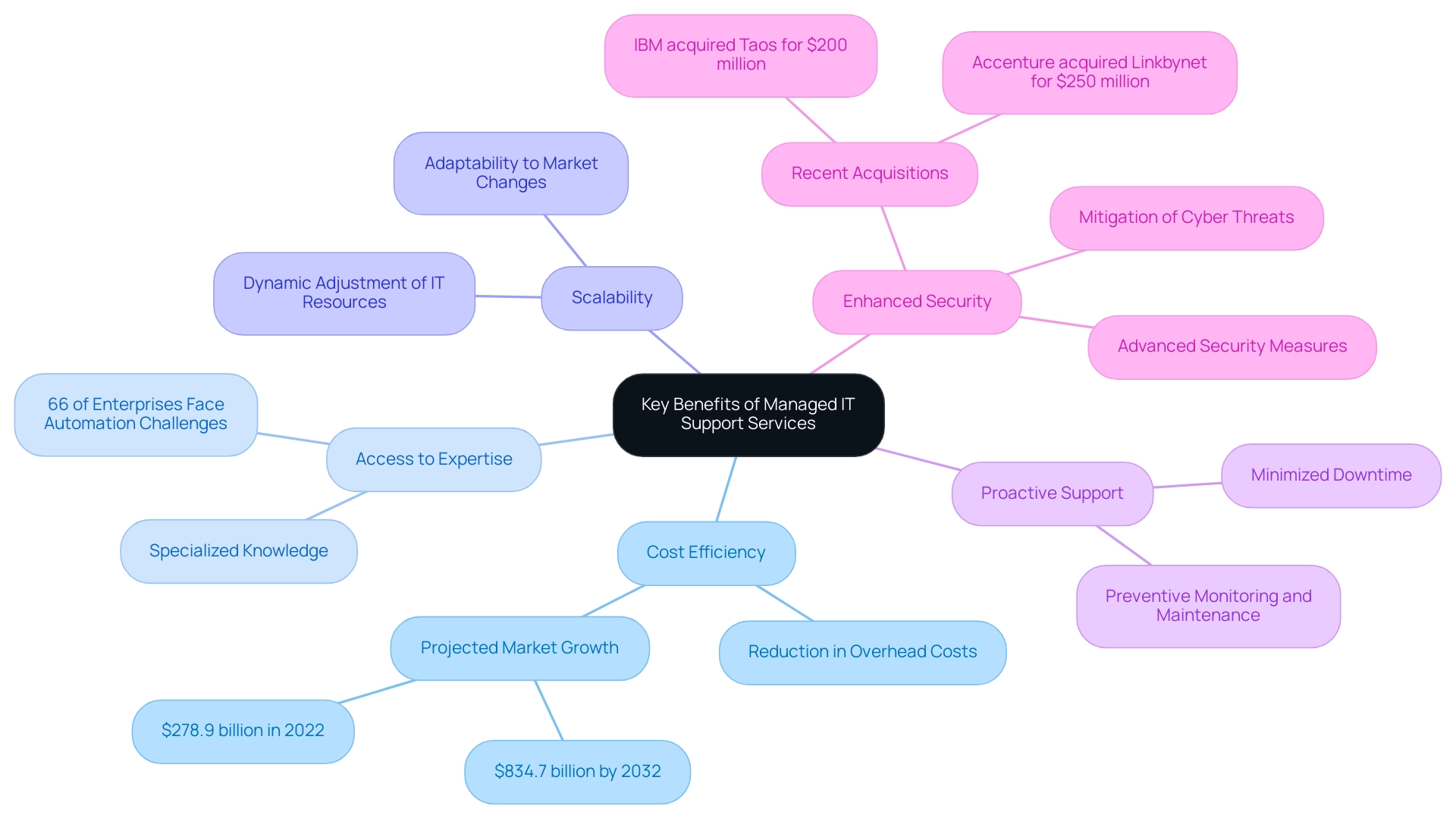
Common IT Challenges Faced by Businesses in London
-
Rapid Technological Change: The swift evolution of technology presents significant challenges for organizations, particularly for those without managed IT support services in London. With projections indicating that by 2025, 70% of the global workforce will work remotely at least five days per month, companies must adapt to this new reality. Such shifts necessitate robust IT strategies, particularly managed IT support services London, to maintain productivity and security across dispersed teams.
-
Cybersecurity Threats: The landscape of cyber threats is becoming increasingly sophisticated, with small enterprises particularly vulnerable to attacks. Recent statistics indicate that a growing number of attacks target these organizations, highlighting the urgent need for comprehensive security measures. Expert opinions emphasize that many small enterprises struggle to implement necessary protections, leaving them exposed to significant risks. According to a report from GOV.UK, actions taken by employees in the UK to identify cyber risks are critical for enhancing overall security posture. As such, organizations must prioritize employee training and awareness to mitigate these threats effectively.
-
Data Management Issues: Effective data management is a crucial concern for businesses, encompassing challenges related to data storage, backup, and regulatory compliance. Failure to address these issues can result in potential data loss and legal ramifications, underscoring the importance of implementing solid data management practices.
-
Operating under tight IT budgets is a common scenario for many organizations, which complicates their ability to invest in essential infrastructure and skilled personnel despite seeking managed IT support services London. Personnel costs in the information sector in Germany, reported from 2012 to 2021, illustrate how budget constraints can impact IT resources. This limitation often results in inadequate technological support and challenges in keeping pace with advancements.
-
Skill Shortages: The lack of qualified IT professionals presents a significant obstacle to effective technology management for organizations. This skills gap can hinder companies from fully leveraging technological advancements, ultimately affecting their operational efficiency and competitiveness. As emphasized in several case studies, including the one titled 'Customer Experience as a Differentiator,' tackling these common IT challenges is crucial for organizations striving to retain their advantage in a rapidly evolving environment.
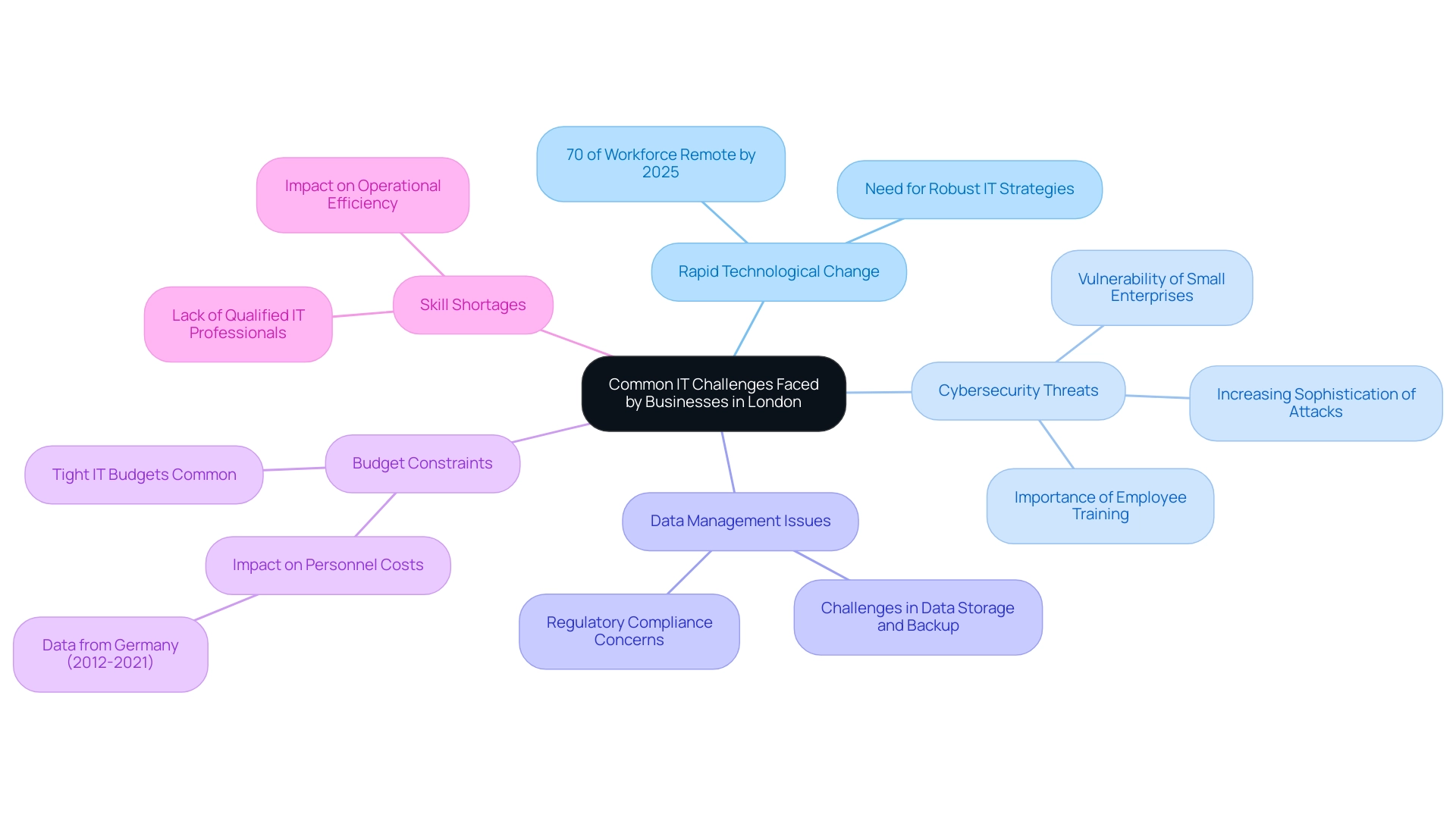
Key Features of Managed IT Support Services
-
24/7 Monitoring: The significance of continuous monitoring of IT systems cannot be overstated. This proactive method allows entities to swiftly recognize and address issues, minimizing downtime and ensuring availability. Statistics indicate that 24/7 IT monitoring can effectively reduce incident response times by up to 50%, fostering a more resilient IT environment. GDS's Security Operations Center (SOC) and Network Operations Center (NOC) solutions exemplify this commitment to vigilance, offering centralized monitoring and proactive threat detection that scales with business growth. The outcome of these services includes enhanced data-driven decision-making, allowing entities to respond strategically to emerging threats and opportunities.
-
Help Desk Support: Access to a dedicated help desk is essential for immediate assistance with technical issues. This level of assistance not only enhances operational efficiency but also significantly improves user satisfaction. Studies indicate that entities adopting efficient help desk assistance can attain response times averaging below 15 minutes, significantly influencing overall productivity. As Tristin Zeman, Digital Marketing Manager at Foresite, observes, "Effective help desk assistance is essential for ensuring that companies can maintain their operations without interruption."
-
Network Management: Comprehensive management of network infrastructure ensures optimal performance and security. By implementing effective network management protocols, organizations can decrease outages by an estimated 70%, resulting in significant cost savings and improved delivery.
-
Regular Updates and Maintenance: Scheduled updates and maintenance are vital for keeping systems running smoothly and securely. Regularly updating software and hardware can mitigate vulnerabilities and improve system performance. This is especially pertinent considering the anticipated global spending on digital transformation, expected to hit $3.4 trillion by 2026, emphasizing the significance of investing in strong IT services to maximize these resources.
-
Backup and Disaster Recovery: Robust backup solutions and disaster recovery plans are critical for protecting data and ensuring continuity. Effective disaster recovery strategies can reduce data loss by up to 90%, safeguarding against both accidental and malicious threats. In today's digital landscape, having a solid plan in place is not just prudent; it's essential for maintaining operational integrity and resilience.
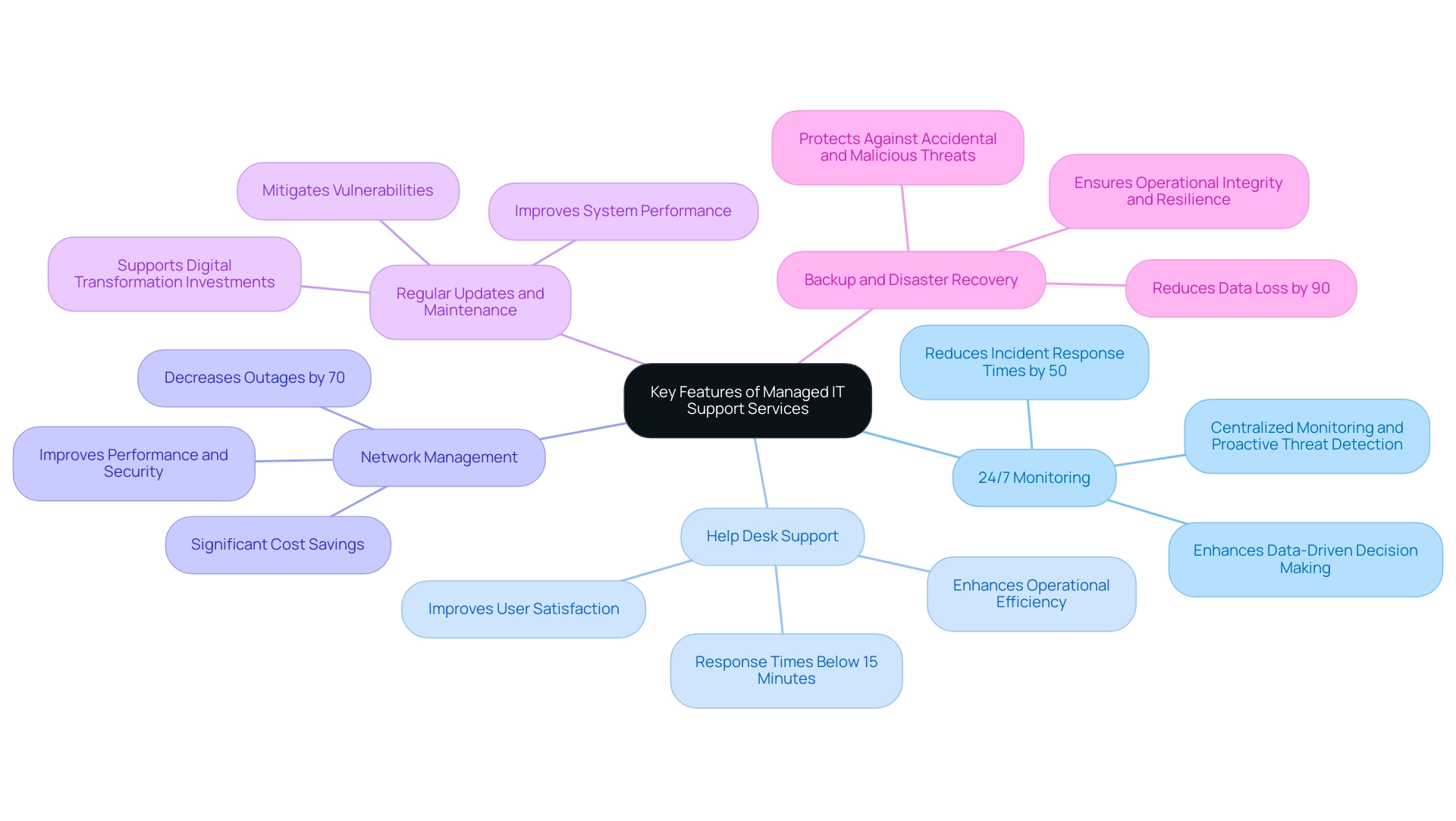
Choosing the Right Managed IT Support Provider
-
Experience and Expertise: When selecting managed IT support services London, it is essential to prioritize those providers that have a robust track record and specific expertise within your industry. Providers with proven success are more likely to comprehend the unique challenges and needs of your enterprise.
-
Service Level Agreements (SLAs): A thorough examination of SLAs is crucial in understanding the provider’s commitments. These agreements should clearly outline response times, availability, and performance metrics, ensuring that your business needs are met consistently. The importance of SLAs is highlighted by the expanding managed solutions market, propelled by constantly changing regulatory compliance and security needs. As noted by MarketsandMarkets, these factors are driving the growth of managed offerings.
-
Scalability of Services: It is essential to ensure that the selected provider can expand its services as your organization grows. In a rapidly changing technological landscape, the ability to adapt solutions to your evolving needs can significantly influence operational efficiency and competitive advantage.
-
Customer Assistance: Assessing the quality and accessibility of customer assistance is essential. A responsive support team that operates during your business hours can mitigate downtime and quickly resolve issues, reinforcing the provider's commitment to your operational success.
-
Reputation and Reviews: Conducting thorough research into the provider's reputation is essential. Search for client testimonials and industry reviews that demonstrate their reliability and quality. Notably, data shows that despite concerns over data security, 78% of global companies trust their outsourcing partners, showcasing the importance of choosing a provider with a solid reputation. This trust is vital as organizations increasingly turn to managed services to navigate complexities, with the USA alone outsourcing over 300,000 jobs annually. Furthermore, it is crucial to consider that 33% of SMBs report testing their disaster recovery plan infrequently or never, highlighting the need for robust IT support in disaster recovery planning. This underscores the importance of selecting a provider that not only offers reliability but also understands the critical nature of effective disaster recovery strategies in managed IT support services London.
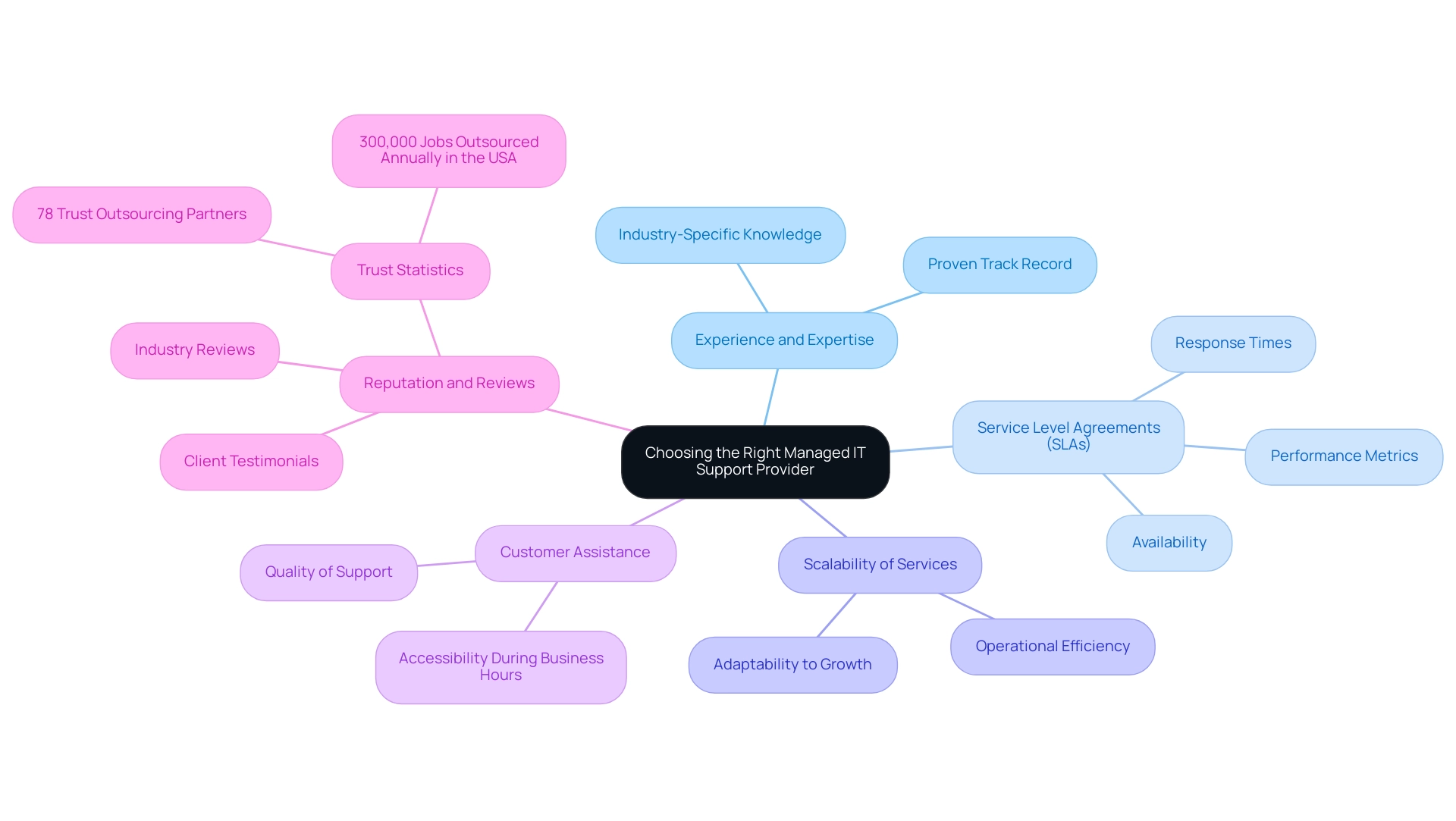
Conclusion
In summary, managed IT support services have emerged as a vital resource for businesses navigating the complexities of the modern digital landscape. By outsourcing IT management to specialized providers, organizations can optimize their operations, enhance security, and access critical expertise that may not be feasible to develop in-house. The key benefits, including cost efficiency, scalability, and proactive support, underscore the strategic advantages of this partnership, allowing businesses to focus on their core functions while mitigating risks associated with technological advancements.
Moreover, the challenges faced by businesses—such as rapid technological change, cybersecurity threats, and skill shortages—further highlight the necessity of engaging a managed service provider. As companies increasingly rely on these services, selecting the right partner becomes crucial. Factors such as experience, service level agreements, and customer support quality are essential considerations that can significantly influence operational success.
Ultimately, embracing managed IT support services is not merely a trend but a strategic imperative for organizations aiming to thrive in an ever-evolving technological environment. By leveraging the expertise and resources of managed service providers, businesses can ensure resilience, security, and sustained growth in a competitive landscape.




